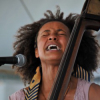Esperanza Spalding

Esperanza Spalding
Esperanza Emily Spalding is an American jazz bassist, cellist, singer, and songwriter. Spalding was raised in Portland, Oregon and was a musical prodigy, playing violin in the Chamber Music Society of Oregon at age five. She was later both self-taught and -trained on a number of instruments, including guitar and bass. Her proficiency earned her scholarships to Portland State University and the Berklee College of Music...
NationalityAmerican
ProfessionJazz Singer
Date of Birth18 October 1984
CountryUnited States of America
I don't watch TV, I don't spend time on the Internet, and I don't party much. I don't text very much, either.
On nights that I'm feeling a need to stretch personally and artistically, I tend to put together outfits that are very quirky, mismatched and over-the-top eclectic.
I write at the piano, so I write things that fit comfortably under my hands, and I'm not thinking in terms of any specific compositional methods. I'm just seeking sounds.
I never think my music isn't easy until I got to teach it to other people.
I like to read, and I like dance. I don't dance, but I like to see other people dance.
I grew up with an incredibly loving and supportive family that gave me the impression there were a lot of options for me out there.
There's enough time in the day: If you go to bed at 10 and start your day at 6, there's a lot you can do in a day!
I always say that the problem with jazz accessibility is not the content of the music, it's people's ability to access it.
Anything I do has to have integrity, so if you just want to make music, it's not difficult finding support. The hard part for a publicist or manager is making a star.
My earliest attempts at writing were when I was seven. I would sit at the piano and transcribe the songs I heard on the radio. I'd change little things in the music and write different lyrics.
It's a pity that if someone who has a really profoundly potent art to share chooses not to or doesn't fit into this very thin slice of what's desirable and marketable, chances are the public will never get a chance to hear what they're doing.
Genre boundaries are good for marketing but they all but disappear when you're a player.
I think there's so much negative influence on children in school settings. It becomes learning by rote to pass a test. It's not contextualized.
If you don't already know about jazz music, how would you be exposed? How would get an opportunity to find out if it spoke to you? If you get exposed to it enough, you might find a taste for it.